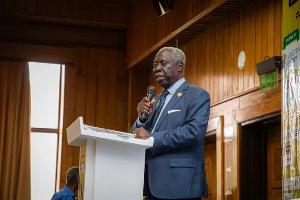 Yaw Osafo Maafo, Senior Presidential Adviser
Yaw Osafo Maafo, Senior Presidential Adviser
Senior Presidential Advisor, Yaw Osafo-Maafo, has stressed the critical importance of capacity-building in the country’s ambitious plans to integrate nuclear power into its national energy mix, amid global climate change mitigation efforts.
Speaking at the third edition of the Africa Nuclear Business Platform meeting in Accra, he said the energy security of Africa hinges on more than just resources and technology; it requires a robust human resource foundation.
“Nuclear energy is one of the clean baseload technologies which, when harnessed, will industrialise and boost the economic growth of the African continent. However, it is no secret that nuclear power is a highly advanced field that demands a specialised workforce with specific skill sets and knowledge,” he stated.
Given this, he noted that the competencies of the individuals involved, from engineers to cleaners, are crucial to the safety and effective running of a nuclear power station. This, he said, calls for rigorous training programmes as well as continuous learning and development opportunities.
Recognising this, he acknowledged that Ghana, just like other African countries, has begun to develop comprehensive human resource plans. These plans involve bilateral cooperation with nuclear vendor countries to ensure a pipeline of highly qualified professionals ready to take on the challenges of the nuclear industry.
The National Energy Transition Framework (NTEF), which serves as the blueprint to decarbonise the energy sector, envisages the introduction of nuclear power into the energy mix by the early 2030s.
It guarantees the best fuel supply security through the provision of a diversified energy mix with nuclear energy expected to contribute more than 40 percent of the required 83 gigawatts (GW) of the projected installed capacity by 2070, to provide cost-efficient electricity generation to accelerate socio-economic development.
Progress on nuclear development
Providing update on the country’s nuclear power development at the meeting, he announced that steps have been taken to identify preferred nuclear sites and back-up sites for Ghana’s first Nuclear Power Plant.
“Our quest to identify a strategic partner will hinge on proven technology, resilient nuclear technology and comfortable financial terms. A request for information (RFI) was issued in 2021 with a request for further information (RFFI) issued in 2023, of which 15 vendor companies participated,” he said.
To this end, he indicated that the RFFI is at its final stages of consideration, of which a vendor and technology will be announced very soon, as it is envisaged to include power into the energy by early 2030s.
He said: “It is my hope that the construction works of Ghana’s first Nuclear Power Plant, which is the phase 3 of the nuclear agenda, will commence in accordance with our national nuclear roadmap to enable us to meet our energy demand as well as meet our carbon emission mitigation targets”.
Moreover, he recognised that the production of adequate electrical power through clean baseload technology, such as nuclear, will serve as a strong backbone for the West African Power Pool (WAPP).
Given this, he maintained that the introduction of nuclear power in the country is a win-win since it provides the vendor the opportunity to explore the West African electricity market as well.
The third edition of Africa Nuclear Business Platform, which is a two-day conference, was held on the theme ‘Driving Nuclear Programme Forward in Africa’.
The Minister of Energy, Dr. Matthew Opoku Prempeh, asserted that energy is the heartbeat of every economy, stressing “it is important that we have enough of it to support our economic and social development, and enhance the welfare of the citizenry”.
On the back of this, he emphasised that the continent’s right to develop its energy resources for the benefit of its people must be respected and allowed with no interference.
But recognising the significance of energy transition (ET), he noted that to the attain Sustainable Development Goals (SDG) and ET targets, Ghana must transition to the production and utilisation of clean energy and implementation of measures to mitigate any emissions that occur in the process.
“This will ensure that we contribute our quota to the reduction of the global greenhouse gas emissions and more importantly, achieve decarbonisation, energy access and security as well as energy efficiency,” he added.